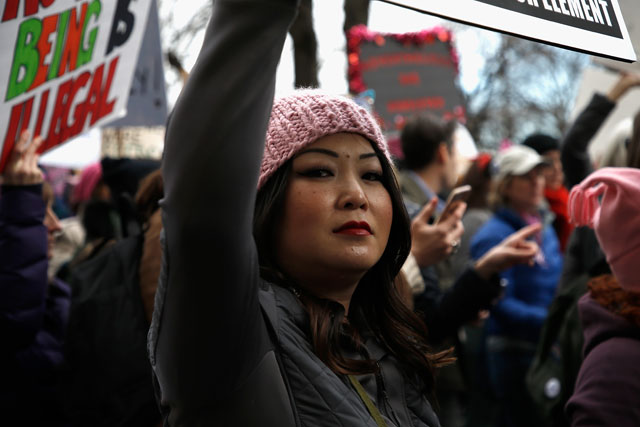
Asian American and Pacific Islander (AAPI) women are at the forefront of many movements for social change — from economic justice to immigrants’ rights and dismantling white supremacy. We’re also leading the movement for gender equality and reproductive justice. AAPIs are the fastest-growing population in the country, and as we rise in numbers and influence, we also rise up for a future that respects our decisions and recognizes our contributions.
This International Women’s Day, I’m marking the accomplishments of AAPI women — and the challenges we continue to face. Forty-five years ago, the Roe v. Wade Supreme Court decision enshrined safe abortion as a legal right in every state. Since 1973, Roe has remained the law of the land — yet at the same time, anti-abortion politicians have taken extraordinary measures to restrict abortion, placing burdens on both the women who need this care and those who provide it. Low-income families, women of color, immigrants, LGBTQ folks and young people bear the brunt of these harmful policies.
It only took three years after Roe v. Wade for Congress to take the first step backward. In 1976, Rep. Henry Hyde wanted to ban abortion for all women. Since he couldn’t do that, he went after the women he did have power over — namely, low-income women enrolled in Medicaid insurance. That was just the beginning. Since 2011, anti-abortion legislators have passed into law 401 new restrictions on abortion. These restrictions harm patients by creating needless delays, forcing clinics to close their doors, and even preventing some women from getting an abortion at all.
The relentless attacks on women’s fundamental reproductive rights have been especially jarring for women of color and immigrants. In states across the country and in Congress, for instance, we’ve seen lawmakers exploit anti-immigrant sentiment and anti-Asian stereotypes to push race- and sex-selective abortion bans deceivingly referred to as the Prenatal Nondiscrimination Act or PRENDA.
So-called “PRENDA” bills threaten women’s health and perpetuate the racist myth that AAPI families do not value girls. Lies like these, especially from public officials, create hostile environments that are particularly dangerous for AAPI women. Since the first PRENDA bill was introduced, it has become a vehicle for anti-women politicians to shame and stigmatize our communities from seeking abortion and reproductive health services. These bills also create hostility toward AAPI women and other women of color by perpetuating anti-immigrant myths about our values and AAPI women as mothers.
Things were getting bad for abortion access before Trump took office; we’ve now gone from bad to worse.
Restrictions on abortion create, and worsen, economic inequalities that disproportionately harm AAPI women. For example, a woman who is denied an abortion is more likely to fall into poverty than one who can get one. Each of us should be able to live, work and make decisions about our health and our future with dignity and economic security. We can’t do that when Trump and Congress keep trying to take away our health care.
But it’s not all doom and gloom in the abortion rights landscape. In Illinois, AAPI women contributed to a historic victory with the passage last fall of HB 40, a new law that lifts the ban on insurance coverage for abortion in Medicaid and secures the right to abortion in Illinois no matter what happens with the Supreme Court.
Illinois is not the only state where advocates are getting proactive. Last year, 21 states enacted 58 new proactive measures to improve reproductive health care access, including 12 on abortion, 35 on contraception and 11 on issues such as sex education.
This year is going to be a crucial one for women, immigrants and low-income people across the country. Even as Trump pushes an agenda that marginalizes us and denies us the health care services we need, we will not be silent. We will not be pushed onto the sidelines.
AAPI communities will be lifting our voices, casting votes and wearing out our shoes talking to our friends and neighbors about the social justice issues that matter most. We’ll be having difficult conversations and building bridges across age, language and geography. Now more than ever, we need to have one another’s backs.
AAPI women and girls are rising up to defy the hateful rhetoric and punitive laws and demand a future where we are all treated with respect and dignity, where no one is denied their human rights based on immigration status or income, where no one goes without health care just because of who they are, where they live or the language they speak.
We are rising up because so much of our story remains unwritten, and we intend to write a future where we can all live as our healthiest, truest and happiest selves.
Join us in defending the truth before it’s too late
The future of independent journalism is uncertain, and the consequences of losing it are too grave to ignore. To ensure Truthout remains safe, strong, and free, we need to raise $29,000 in the next 36 hours. Every dollar raised goes directly toward the costs of producing news you can trust.
Please give what you can — because by supporting us with a tax-deductible donation, you’re not just preserving a source of news, you’re helping to safeguard what’s left of our democracy.